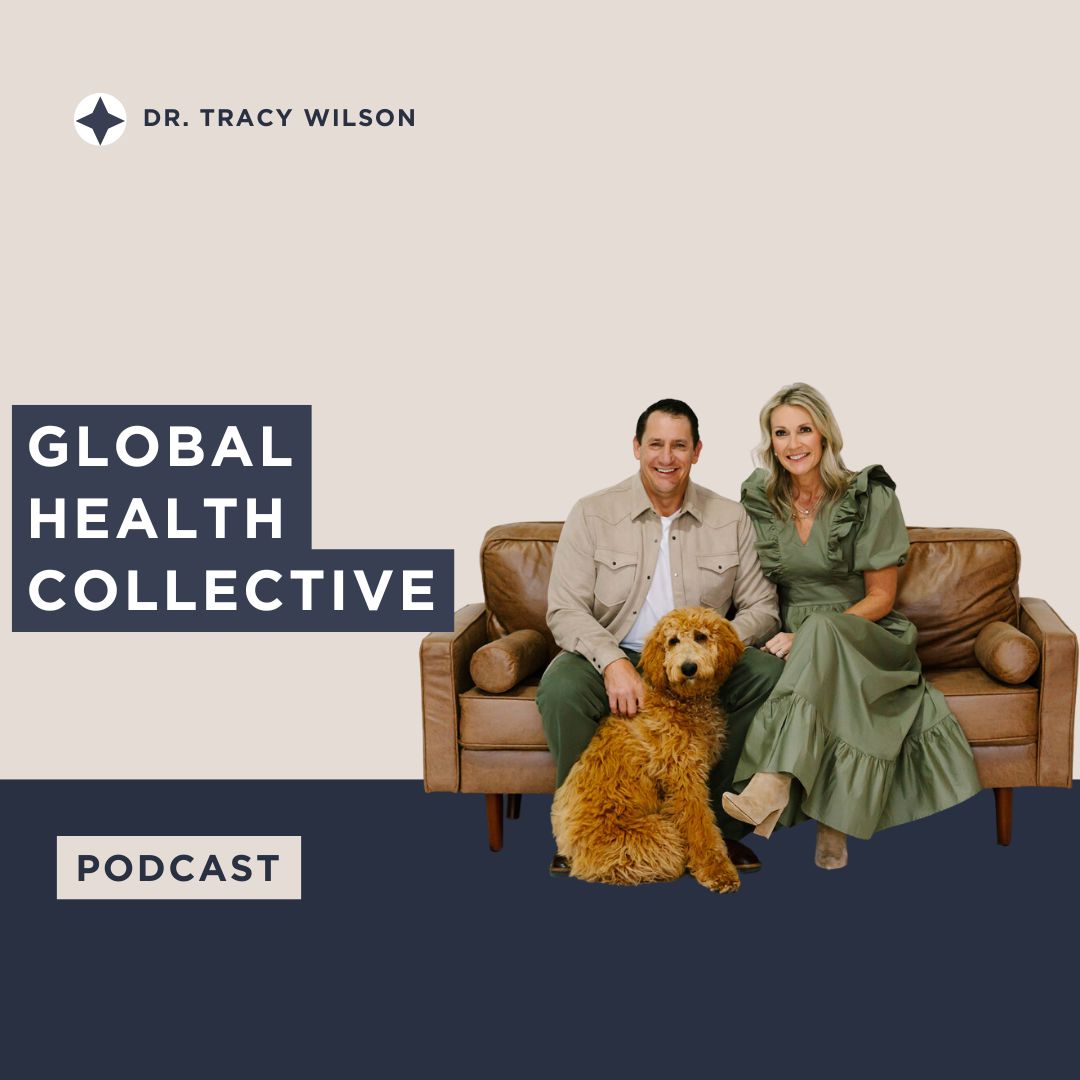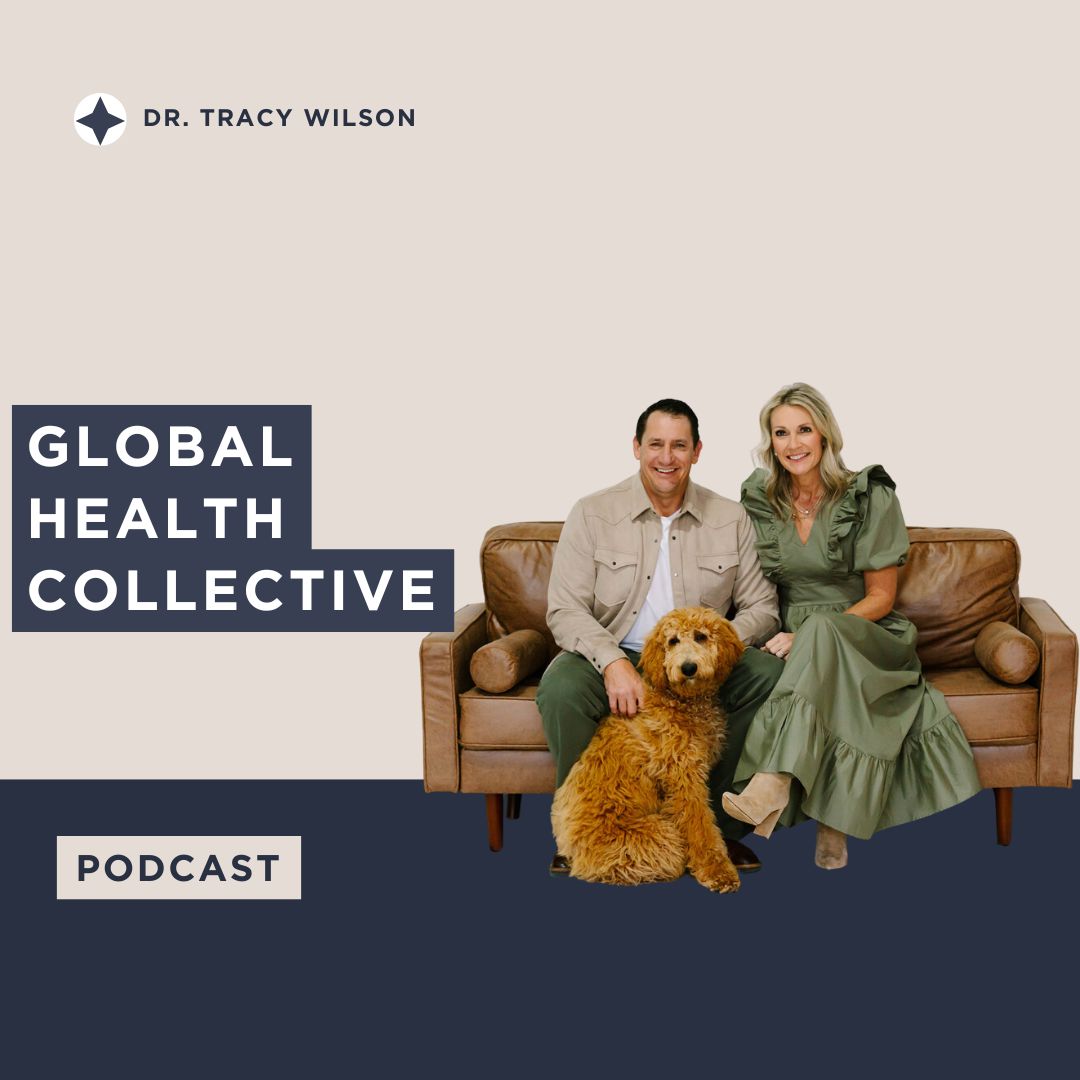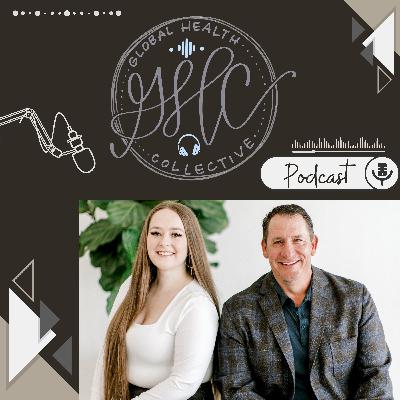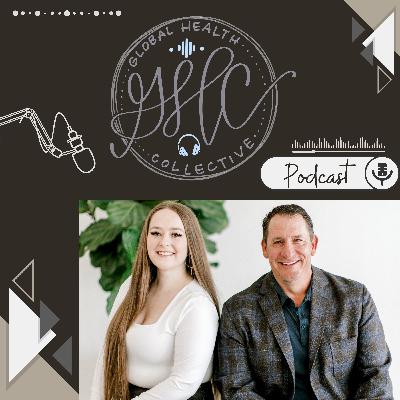Discover Global Health Collective
Global Health Collective

Global Health Collective
Author: Dr. Tracy Wilson
Subscribed: 0Played: 0Subscribe
Share
© 2023
Description
This podcast is to promote health and wellness for families of west texas. We will focus on supporting moms, dads, and children in their health and wellness journey. We will not only provide helpful information but we will provide interviews with industry experts that will give families supportive information.
14 Episodes
Reverse
Episode Title: New Year, New Spine (Part 2) In this Global Health Collective Podcast episode, Dr. Wilson and Amy continue the "New Year, New Spine" series, which focuses on building a healthier lifestyle through balanced nutrition and regular chiropractic care. They also discuss the power of the SMART goal system for setting achievable health targets, especially for families with young children. Topics include: The benefits of anti-inflammatory foods and how to avoid the pitfalls of processed options. How stress, poor nutrition, and lack of sleep weaken the immune system. The importance of regular chiropractic adjustments to support nervous system health. Practical tips for meal prepping and incorporating healthier habits into family routines. Action Steps for Your Family: ✔️ Prepare three breakfast and three lunch options for the week. ✔️ Explore anti-inflammatory foods and try the provided 7-day meal plan. ✔️ Encourage kids to try new healthy foods, like Brussels sprouts. ✔️ Use glass containers instead of plastic for safer food storage. ✔️ Schedule regular chiropractic visits to support immunity and overall health. Plus, don't miss the announcement of their new Amazon storefront, featuring curated health tools and products to help you stay on track this year. Tune in for simple, actionable steps to start 2025 with a healthier spine and lifestyle! GHC Amazon link CLICK HERE Anti-Inflammatory Food List Click Here
No show notes... Enjoy the podcast, and Let's get serious about thriving in 2025.
Stress can have a significant impact on both physical and mental health, leading to various health challenges and quality of life issues. Some of the common health challenges and quality of life issues associated with stress include: 1. Mental Health Issues: Chronic stress can contribute to the development or worsening of mental health conditions such as anxiety disorders, depression, and mood disorders. 2. Cardiovascular Problems: Prolonged stress can increase the risk of heart disease, high blood pressure, stroke, and other cardiovascular issues. 3. Weakened Immune System: Stress affects the immune system, making individuals more susceptible to infections, viruses, and autoimmune disorders. 4. Digestive Disorders: Stress can disrupt the normal functioning of the digestive system, leading to issues such as irritable bowel syndrome (IBS), acid reflux, stomach ulcers, and appetite changes. 5. Sleep Disturbances: Stress often causes sleep problems, including insomnia, frequent waking during the night, or difficulty falling asleep. Lack of quality sleep can further exacerbate stress levels. 6. Chronic Pain: Stress can intensify chronic pain conditions, such as headaches, migraines, back pain, muscle tension, and fibromyalgia. 7. Weight Gain or Loss: Stress can affect appetite and lead to unhealthy eating habits, resulting in weight gain or loss. Emotional eating or loss of appetite are common responses to stress. 8. Reduced Energy and Fatigue: Chronic stress can drain energy levels, leading to persistent fatigue and a lack of motivation. 9. Impaired Cognitive Function: Stress can impair concentration, memory, and decision-making abilities, making it difficult to focus and perform daily tasks effectively. 10. Relationship Issues: Stress can strain relationships and social interactions, leading to conflicts, communication problems, and feelings of isolation or loneliness. 11. Decreased Productivity: Stress can negatively impact work performance, productivity, and overall job satisfaction. 12. Emotional Well-being: Stress can contribute to irritability, mood swings, emotional instability, and a decreased sense of well-being. It is important to manage stress effectively Listen in and learn what you can do about it..
Episode 1: Introduction to Men's Health - **Discuss Importance**: Explain why maintaining good health is crucial for longevity, productivity, and quality of life. - **Common Health Issues**: Highlight common health problems like heart disease, diabetes, and low testosterone. - **Natural Approaches**: Introduce the concept of natural health improvement through diet, exercise, and lifestyle changes. Episode 2: Improving Health Through Diet - **Essential Nutrients**: Discuss the importance of proteins, healthy fats, vitamins, and minerals. - **Foods to Include**: - Lean meats, fish, eggs - Leafy greens, colorful vegetables, fruits - Whole grains like quinoa, brown rice, oats - Nuts, seeds, and healthy oils (olive oil, avocado) - **Balanced Meals**: Explain portion sizes and creating balanced plates (e.g., half vegetables, a quarter protein, a quarter carbs). - **Meal Plans**: - Provide a week-long meal plan with breakfast, lunch, dinner, and snack ideas. - Recipes for simple, nutritious meals like grilled chicken salad, quinoa bowls, and smoothies. Episode 3: Exercise for Optimal Health - **Benefits**: Discuss how exercise improves cardiovascular health, muscle strength, mental health, and more. - **Types of Exercises**: - **Strength Training**: Weight lifting, bodyweight exercises (push-ups, squats). - **Cardio**: Running, cycling, swimming, brisk walking. - **Flexibility**: Stretching routines, yoga. - **Balanced Routine**: Suggest a weekly plan: - **Monday**: Strength training (upper body) - **Tuesday**: Cardio (running or cycling) - **Wednesday**: Flexibility (yoga or stretching) - **Thursday**: Strength training (lower body) - **Friday**: Cardio (swimming or brisk walk) - **Saturday**: Mixed workout (light strength and cardio) - **Sunday**: Rest or light stretching - **Staying Motivated**: Set realistic goals, track progress, find a workout buddy, and vary routines to keep it interesting. Episode 4: Lowering Cholesterol Naturally - **Understanding Cholesterol**: Explain HDL vs. LDL cholesterol and their impacts on health. - **Dietary Changes**: - Increase intake of soluble fiber (oats, beans, lentils). - Include healthy fats (avocados, nuts, olive oil). - Eat fatty fish rich in omega-3s (salmon, mackerel). - Reduce saturated and trans fats (processed foods, red meat). - **Lifestyle Changes**: - Regular physical activity (at least 30 minutes a day). - Maintain a healthy weight. - Avoid smoking and limit alcohol consumption. - **Supplements**: Discuss natural supplements like plant sterols, psyllium husk, and fish oil. ### Understanding Cholesterol: HDL vs. LDL and Their Impacts on Health **What is Cholesterol?** Cholesterol is a waxy, fat-like substance found in every cell of the body. It is essential for the production of hormones, vitamin D, and substances that help you digest foods. While cholesterol is vital for many bodily functions, too much of it in the blood can lead to serious health issues. **Types of Cholesterol: HDL vs. LDL** 1. **HDL (High-Density Lipoprotein) Cholesterol: The "Good" Cholesterol** - **Function**: HDL cholesterol helps remove other forms of cholesterol from your bloodstream. It transports cholesterol from other parts of your body back to your liver, where it is processed and eliminated from your body. - **Impact on Health**: High levels of HDL cholesterol are associated with a lower risk of heart disease. It is beneficial because it helps prevent cholesterol buildup in your arteries, reducing the risk of atherosclerosis (hardening and narrowing of the arteries). 2. **LDL (Low-Density Lipoprotein) Cholesterol: The "Bad" Cholesterol** - **Function**: LDL cholesterol carries cholesterol to your arteries, where it may accumulate on the walls of your arteries, forming plaque. - **Impact on Health**: High levels of LDL cholesterol can lead to plaque buildup in your arteries. This buildup narrows the arteries, making it harder for blood to flow through them. If a plaque ruptures, it can form a clot, leading to a heart attack or stroke. Therefore, LDL cholesterol is considered "bad" because of its role in plaque formation and cardiovascular disease. **Balancing HDL and LDL Levels for Optimal Health** - **Desirable Levels**: - **HDL**: An HDL level of 60 mg/dL and above is considered protective against heart disease. - **LDL**: An LDL level below 100 mg/dL is optimal, and below 70 mg/dL is recommended for those at high risk of heart disease. **Factors Affecting Cholesterol Levels** 1. **Diet**: - Saturated and trans fats increase LDL cholesterol. These fats are found in red meat, full-fat dairy products, and many processed foods. - Soluble fiber, found in oats, beans, and fruits, can help reduce LDL cholesterol. - Healthy fats (monounsaturated and polyunsaturated fats) found in olive oil, avocados, and nuts can improve HDL cholesterol levels. 2. **Physical Activity**: - Regular exercise can help raise HDL cholesterol and lower LDL cholesterol. Activities such as walking, jogging, and swimming are beneficial. 3. **Weight Management**: - Being overweight or obese tends to increase LDL cholesterol levels and lower HDL cholesterol levels. Losing weight can help improve these levels. 4. **Smoking**: - Smoking lowers HDL cholesterol and increases LDL cholesterol. Quitting smoking can improve your HDL cholesterol level. 5. **Alcohol Consumption**: - Moderate alcohol consumption has been linked to higher HDL cholesterol levels, but excessive drinking can lead to serious health problems, including high cholesterol levels and heart disease. **Natural Approaches to Manage Cholesterol** 1. **Dietary Changes**: - Increase intake of fruits, vegetables, whole grains, and lean proteins. - Incorporate foods rich in omega-3 fatty acids, such as salmon, flaxseeds, and walnuts. - Add soluble fiber sources like oatmeal, beans, and lentils to your diet. 2. **Exercise**: - Aim for at least 30 minutes of moderate-intensity exercise, such as brisk walking, on most days of the week. 3. **Weight Management**: - Maintain a healthy weight through a balanced diet and regular exercise. 4. **Stress Management**: - Practice stress-reducing techniques like yoga, meditation, or deep breathing exercises. 5. **Natural Supplements**: - Consider supplements such as plant sterols, psyllium husk, and fish oil, which may help manage cholesterol levels. **Conclusion** Understanding the difference between HDL and LDL cholesterol is crucial for maintaining heart health. By making informed lifestyle and dietary choices, you can manage your cholesterol levels effectively, reducing the risk of cardiovascular disease and promoting overall well-being. Always consult with a healthcare professional before making significant changes to your health regimen or starting new supplements. Episode 5: Dealing with Belly Fat Naturally - **Causes**: Explain hormonal factors, poor diet, lack of exercise, and stress. - **Dietary Changes**: - Reduce sugar and refined carbs. - Increase fiber intake (vegetables, whole grains). - Focus on protein-rich foods. - **Effective Exercises**: - High-Intensity Interval Training (HIIT). - Core exercises like planks, Russian twists, and leg raises. - Cardio exercises (running, cycling, swimming). - **Lifestyle Tips**: - Manage stress through mindfulness, meditation, and adequate sleep. - Stay hydrated and avoid sugary drinks.
Perinatal is termed as the period of time when you become pregnant and up to a year after giving birth. Today we focus on getting chiropractic care during pregnancy and post delivery. 4 phases we discus Protect Prepare Process Perform Share with all your momma friends and those who are thinking about becoming moms..
Have you ever wondered what happens when you get adjusted? In this podcast we cover why you need to be adjusted on a regular basis.. Dig into this 18 minutes to learn about some terms that may have never known.
Today we discuss the following topics Chemical Swaps for a Healthier Home A. Kitchen and Household Cleaning Products 1. Transitioning to non-toxic cleaning solutions for a safer environment 2. DIY cleaning recipes that promote both physical and emotional wellness 3. Recommended brands that prioritize both health and sustainability Home Fragrances and Air Quality 1. Understanding the impact of synthetic fragrances on emotional health 2. Using essential oils and natural scents to create a soothing atmosphere 3. Improving indoor air quality for better emotional and physical health Along with some personal health and wellness. Links for topics discussed here.. Women, Wine, and Wellness tickets here Doterra oils Cleaning Recipes AO Scanning questions On Guard information
Welcome to our latest podcast "Spring into Healthy Habits: Pediatric and Parent Wellness Edition." Today we focus on: promoting pediatric wellness during the spring season, and how we get our kids and our bodies ready for all things Spring. Spring Cleaning, spring sports, and summer vacations. Get ready to have some fun on this one. Dr. Wilson and Dr. Elizabeth take you on a fun and informative ride.
*Segment 1: Eating Right for a Healthy Family* - Importance of nutritious eating habits for overall health - Discussion on the impact of diet on family well-being - Practical tips for meal planning, grocery shopping, and cooking healthy meals together *Segment 2: Addiational Wellness Tips for Families* - Additional wellness tips for promoting a healthy lifestyle within the family - Discussion on the importance of adequate sleep, stress management, and mental health support
Segment 1: The Foundation of Wellness* - We discuss the significance of holistic wellness - Explanation of how self-love and care translate into better family health - Introduction to key pillars: regular chiropractic adjustments, exercise, nutrition/Supplements, massage, meditation, Self talk.. (I am statements) *Segment 2: The Benefits of Regular Chiropractic Adjustments* - We give 2-3 benefits of getting adjusted on a regular basis - We explanation of how chiropractic adjustments contribute to overall well-being - Discussion on the importance of spinal health for optimal functioning - Tips for incorporating chiropractic care into family wellness routines *Segment 3: Exercise for Body and Bonding* - Highlight the importance of regular physical activity (kinds of workouts, aerobics, hiit, yoga, ) for both individual and family health - Tips for making exercise a fun and family-friendly activity - Discussion on various forms of exercise suitable for different age groups and fitness levels
Dr. Wilson goes into detail about the diffferent aspects of your immune function cell by cell and yet keeps it easy to understand. If you have ever wondered how your immune system works in a quick 23 minutes. This is your episode.
Welcome to the Global Health Collective podcast, where we explore the latest trends, insights, and innovations in the world of health and wellness. In this special episode, we kick off the year with an empowering discussion on setting health goals in 2024. As we navigate the ever-evolving landscape of global health, it's essential to establish realistic and impactful goals that promote personal well-being and contribute to the collective health of our communities. Join us as we sit down with leading experts Dr. T. D. Wilson and Dr. Elizabeth Bush who have successfully transformed their lives through intentional goal-setting. We share their experiences, challenges, and triumphs in the pursuit of health and wellness. From adopting sustainable lifestyle changes to embracing innovative technologies, we delve into diverse strategies that can help you achieve your health goals in 2024 and beyond. Discover the latest research on nutrition, exercise, mental health, and preventive care that can guide you in making informed decisions for your well-being. We also explore the role of technology, community engagement, and policy changes in shaping the future of global health. Whether you're a seasoned health enthusiast or someone just beginning their wellness journey, this episode provides valuable insights and practical tips to inspire and motivate you throughout the year. Let's make 2024 a year of thriving, resilience, and positive health transformations. Tune in to the Global Health Collective podcast and join the conversation on setting and achieving health goals that have a lasting impact on individuals and communities worldwide. Together, let's create a healthier and happier future for everyone.









